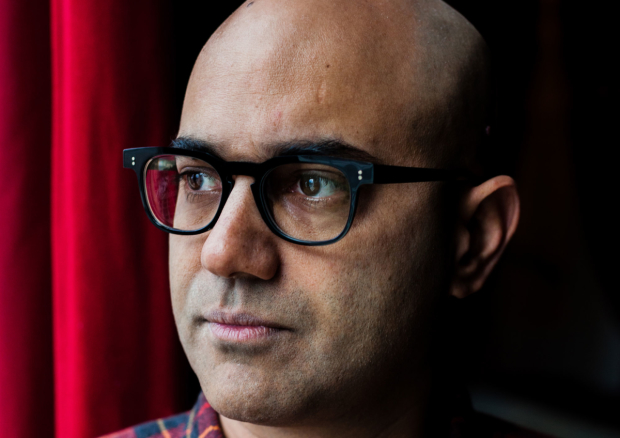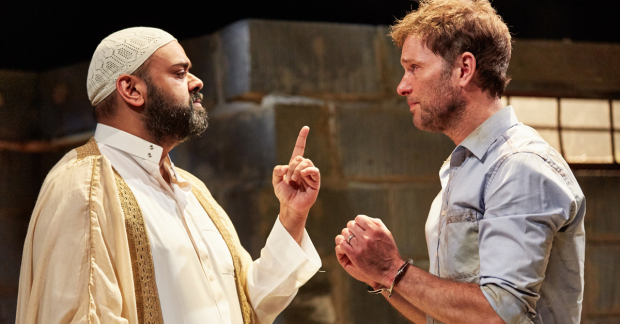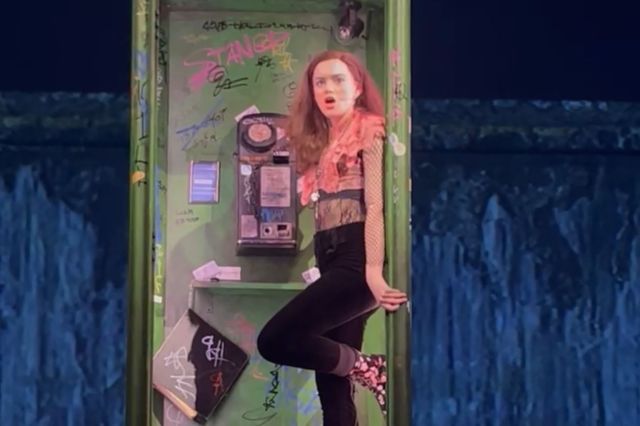Ayad Akhtar: 'The petri dish of British theatre is overflowing with rich abundance'
The Pulitzer Prize-winning playwright discusses the arts scene in the US at the moment, being put into boxes as a playwright and his love for economics

© Florian Thoß

American playwright, novelist, screenwriter and actor Ayad Akhtar won the Pulitzer Prize for drama in 2013 for his play Disgraced, which looks at identity politics in modern America. His work The Invisible Hand received its UK premiere at the Tricycle Theatre in 2016 to rave reviews and the New York production won an OBIE award for playwriting. As well as his plays, Akhtar has written American Dervish, a coming of age novel about a Pakistani-American boy growing up in Milwaukee, and The War Within, a film in which he also starred. His next work, Junk, is an all-encompassing, epic in scale look at debt and the origin story of finance today, which opens at the Lincoln Centre in New York later this year.
You’re in New York at the moment, how does it feel over there?
It’s fine, it’s getting a little hot, it’s a bit mad like London is at the moment, but for different reasons. We have a mad man in office. His internal madness has become our madness.
Has the atmosphere changed a lot?
Yes, I’ve been going to Wisconsin a lot recently too and there’s generally been a breakdown of civility that is very real. There’s a sense of disrespect, mutual suspicion, contempt and vocalised aggression. It’s ever-present. It feels tribal – it’s a tribal identity that gets the hair on the back of people’s necks up very quickly.
In light of the Julius Caesar in Central Park, does it feel like your work as a writer is in any way being threatened?
I’m not sure it does. I have always been very sensitive to manufactured consent. There’s always a degree of censorship when it comes to speaking about what really matters. I don’t think that’s changed, I think that’s more apparent. It’s this idea that somehow terrorism has nothing to do with us, that ‘they’ are just a bunch of crazy people. And when some white guy takes an AK-47 and shoots a bunch of people there is no social disease that has to be analysed. I’m not flying the flag of white identity versus immigrant identity, but on some level what is accepted within the social body as legitimate discourse has been censored for generations in this country. Even though we espouse the values of heterogeneity, we are actually all looking to be the same in some way.
Does that feel scary?
The thing that scares me is that we don’t understand what’s really going on: our country is being sold out from under us. This notion that the private sector is going to run things more efficiently is like listening to some kind of speech at the politburo during the Stalinist era. I’m not a bleeding heart liberal, or a Communist I am just somebody who likes to look at reality – our country is falling apart. The lack of any interest in the public welfare – by that I just mean public good – is so blatant. So to me, this Donald Trump episode represents a kind of late stage metastasized version of something that’s been going on for a couple of generations.

© Mark Douet
What you’re saying rings a lot of bells for this side of the pond as well….
In some ways this came into being under Thatcher and Regan. They were really the first popularisers of a lot of this stuff. So I think that England and the US bear a great responsibility for the state that we all find ourselves in.
Within the current context then, do you find yourself being put into boxes or being categorised as a specific type of playwright?
Sure, I always have been. That’s always been a part of my journey. I think it’s normal, I understand it, I don’t mind the boxes as long as people don’t expect me to play along. My simplest way of putting it is: I don’t care what kind of question you ask me as long as you don’t care what answer I give you. At the end of the day, we’re going to look at each other and we are going to make cognitive shortcuts to try to understand who we think other people are. That’s just human. My play The Invisible Hand, which opened at the Tricycle last year, was set in Pakistan. People could say the play’s about Islam, but it’s not about Islam, it’s really about the religion of free market ideology. But I have been pleasantly surprised that so many audience members encounter the work that they see, rather than the work that they bring to it.
You seem to know a vast amount about economics, has that always been the case?
My mum and my dad are both doctors and when I first moved to New York they were concerned that I was reading poetry all the time and worried about what I was going to do with my life. So my dad made a deal with me. He said if I read the Wall Street Journal every day, he’d cover my rent. He knew that if I read a lot about something I would get interested in it and he was right, I got really interested in it.
I guess that means research for your new play wasn’t too painful, then?
The research for Junk – which opens in the fall on Broadway – wasn’t like wandering without a guide through the forest. But it was definitely intense. It is about debt financing and about the history of debt as a tool for unmaking older structures. It’s about how free money and debt changed the way we think about being human, actually, not just money. It deals with immigrant identity as well but not just about the Muslim version. There are young Jewish financiers talking on the old WASP guard. It’s an attempt at a Shakespearian history, where you have a capital magnate standing in for kings and you have the legal and accountancy adviser class underneath that.
You’ve worked in both the UK and the US, what did you feel are the main differences in the theatre scenes?
I would say that in the UK there is a social commitment to the theatre. The audiences are well versed in the form. The way I put it to friends here in the US is to say: The Brits have a national writer – we don’t even have a national writer – and their national writer is a playwright! You guys have an exposure to a rich performative language. In the US, nobody goes to plays, unless you live in New York. There isn’t a national obsession or a national interest in the theatre, so it just creates a different kind of petri dish. The petri dish of British theatre is overflowing with rich abundance that just can’t be rivalled. In a way it all boils down to Shakespeare.
You won the Pulitzer for Disgraced, did it change your life immediately?
It changed my life completely in the sense that people actually wanted to read my work after that. I had been writing since I was 15, so at that point I had been writing for 27 years. But I came out of nowhere to a lot of people because I hadn’t been writing for professional theatre. So after winning the prize, people wanted to read my work . But it doesn’t necessarily mean that you’re any better a writer than before you won it. I have to continue to try to get better at what I do.













